Home
ABOUT
BIOGRAPHY
WORK
CONTACT

Home
ABOUT
BIOGRAPHY
WORK
CONTACT
スマホでご覧の方は、
画面を横向きにするとより見やすくなります。
Read the passage and choose the best answer among the four choices for each question.
The allure of Japanese bell cricetks
This summer, which was very hot, is finally coming to an end. There are many seasonal features around this time of year, and the chirping of Japanese bell crickets is one of them. The chorus is very pleasant and reminds us of the coming of autumn.
Japanese bell crickets, a member of the cricket family, emerge in late July and chirp until late September, but by early October almost all of the adult crickets are dead. Since the chirping of the bell crickets takes place only when the temperature is between 15 and 30 degrees Celsius, they do not sing during the too-hot summer daytime but rather in the evenings when the weather is cooler. In autumn, the temperature is suitable all day long, so they sing throughout the day. This is why we consider bell crickets to be autumn insects.
Some people might think that all bell crickets sing because they make such a loud noise, but, in fact, only the males do. This chirping is a kind of courtship behavior to attract the attention of females. Also, has anyone noticed that, despite the fact that they are singing loudly everywhere, you can’t hear the chirps when you are talking on your phone? Smartphones are designed so that we can best listen to sounds in the 300-3400 Hz range, which is in tune with human voices. However, since the volume of the chirps is about 4500 Hz, they are barely audible during a call.
Surprisingly, it is only the Japanese who find the chirping of bell crickets pleasant. It seems that to Westerners, these insect sounds are either irritating noise or not even noticed. We do not know exactly why, but the differences in childhood spoken languages and cultures surrounding insect sounds has been cited. The Manyoshu, a collection of poetry written over 1,300 years ago, includes waka poems about appreciating the sound of insects. Moreover, Japanese people used to have bell crickets as their pets until WW2. These facts exemplify how special bell crickets are to Japanese people.
Practice!
Q1. In autumn, bell crickets chirp all day long because
Q2. We cannot hear the chirps of bell crickets during a phone call because
Q3. The reason why bell crickets are special to Japanese people is not that
解答
Q1. 1
Q2. 2
Q3. 3
解説
Q1.
第2段落3文目で、スズムシが秋に1日中鳴いている理由として、”the temperature is suitable”が挙げられている。
Q2.
第3段落4,5文目から、スマートフォンは300-3400Hzの音が聞こえるように設計されているのに対して、スズムシの鳴き声は約4500Hzであるために通話中に聴こえないことが分かる。
Q3.
第4段落1,4,5文目で、日本人にとってスズムシが特別な存在である理由が言及されており、それぞれ、鳴き声が心地よく聴こえること、万葉集にも登場したこと、戦前まではペットとして飼う習慣があったことが挙げられている。
解釈
第1段落






第2段落
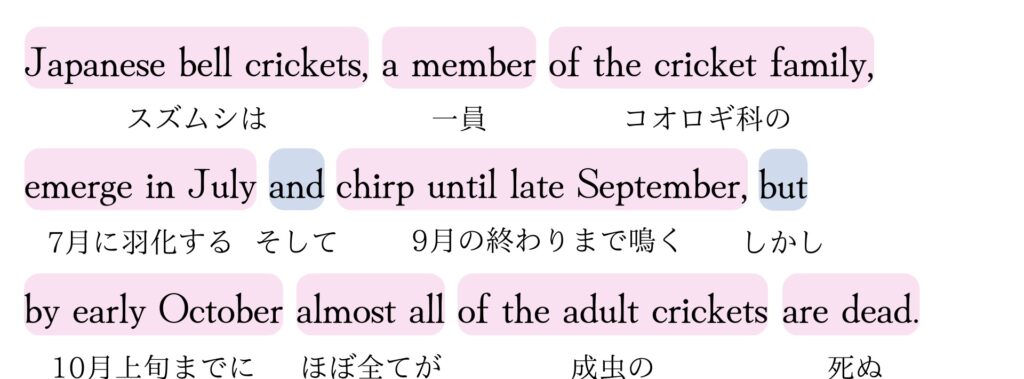

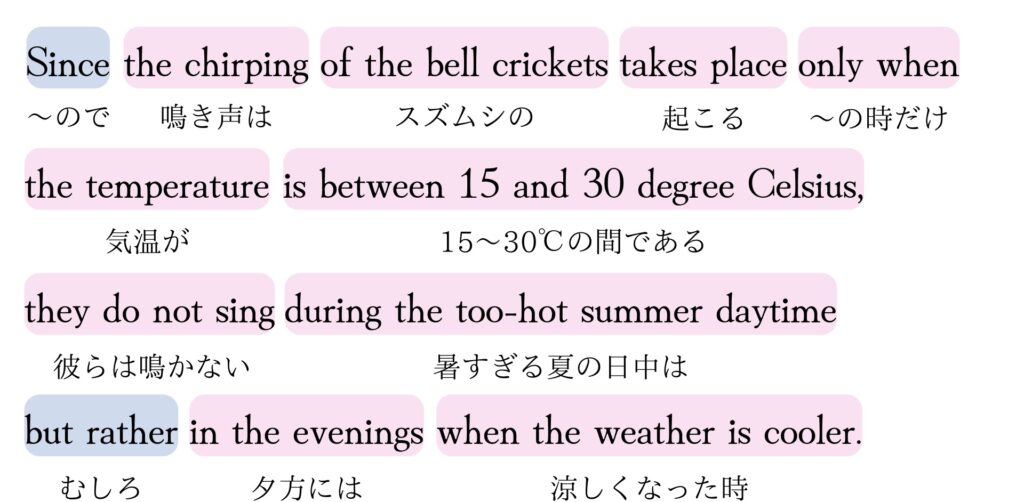





第3段落




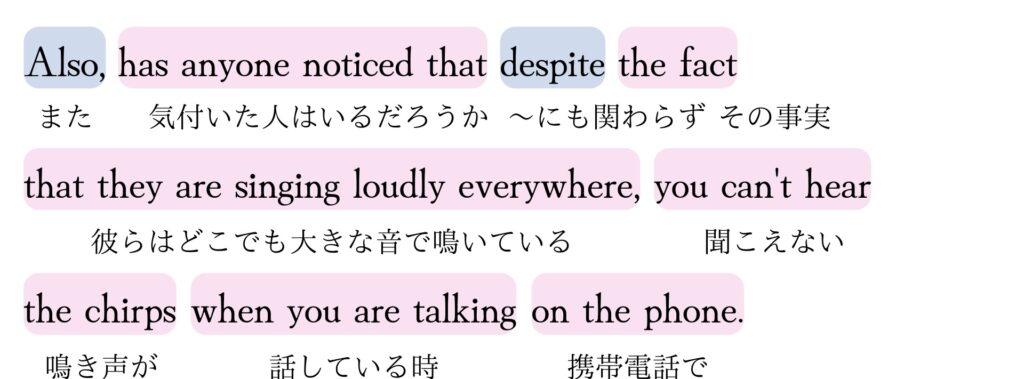





第4段落




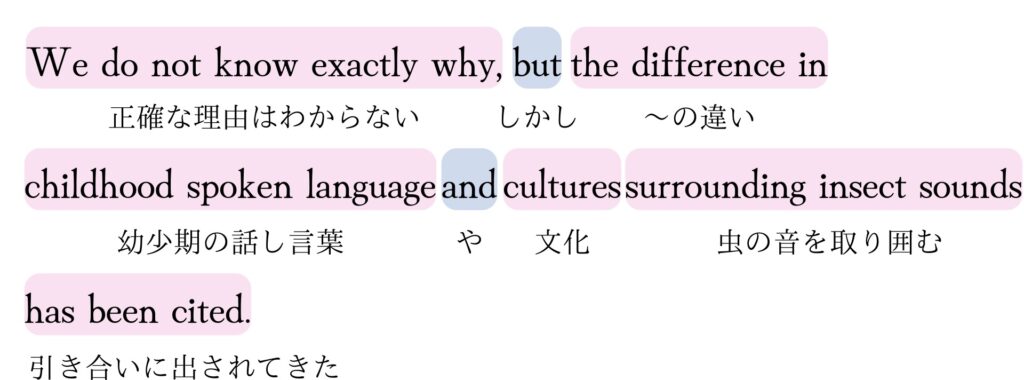

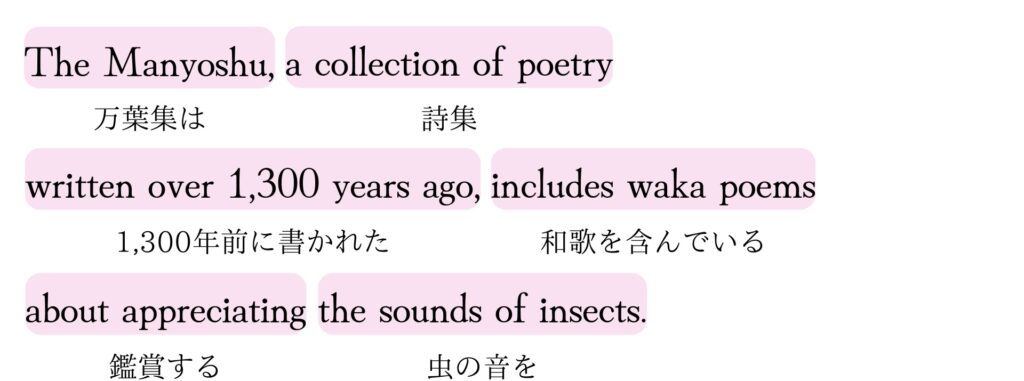





全訳
非常に暑かった今年の夏もようやく終わりが見えてきた。この時期の風物詩は沢山あるが、スズムシの鳴き声もそのうちのひとつだ。夕暮れ時に聞こえるスズムシの合唱はとても心地良く、我々に秋の訪れを感じさせる。
スズムシは日本産のコオロギ科の昆虫である。7月下旬頃に成虫が羽化し、9月の終わり頃まで鳴いているが、10月の上旬にはほぼ全ての成虫が死んでしまう。スズムシが活発に鳴くのは気温が15度から30度の間だけなので、暑すぎる夏の日中は鳴かず、涼しくなってくる夕方以降から鳴き始めるのだ。秋は一日を通して適した気温なので、ずっと鳴いている。これが、我々がスズムシを秋の虫だと考える理由である。
あれ程までに大きな音を立てているのだから、全てのスズムシが鳴いていると考えている人もいるだろうが、実は鳴いているのはオスだけなのである。この鳴き声は、メスの関心を引くための求愛行動の一種なのだ。また、どこでも大きな音で鳴いているにも関わらず、スマホで通話しているときにスズムシの鳴き声が聞こえないことに気づいた人はいるだろうか。スマホは人間の声に合わせて300~3400Hzの音域が最も良く聞こえるように設計されているが、スズムシの鳴き声の音量は約4500Hzなので、通話中にはほとんど聞こえないのだ。
意外にも、スズムシの鳴き声を心地よいものと感じているのは日本人だけだそうだ。欧米人にとって、このような虫の鳴き声は雑音として聞こえているか、もしくは鳴いていることにすら気づいていないらしい。正確な理由は不明だが、幼少期の話し言葉の違いや、虫の鳴き声に対する文化の違いが挙げられている。約1300年前に変遷された”万葉集”にも虫の声を鑑賞する和歌があったり、戦前まではスズムシを飼う文化があった。それほどまでに、日本人にとってスズムシは特別な存在なのだ。
[swpm_login_form]